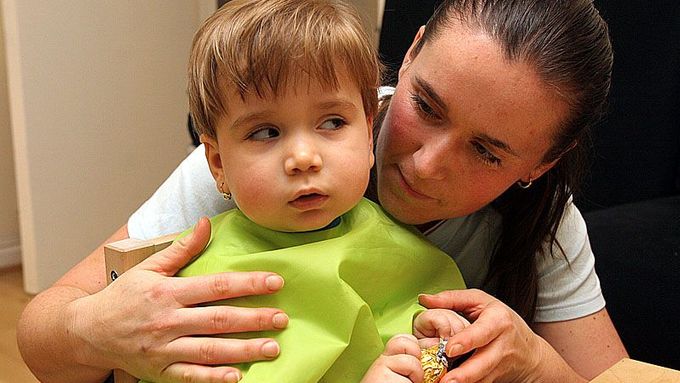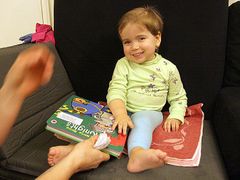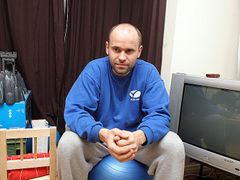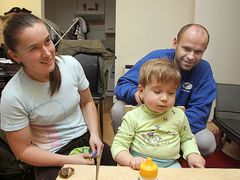London - In the late afternoon, buses are bringing large crowds of people back from work to their homes in Selhurst, south-west London. One of the houses is home to a Slovakian family that moved here a year ago.
Their work day never ends. Their three-year-old daughter Viktoria suffers from muscular dystrophy that prevents her from moving and she is blind.
The care for her requires a non-stop attention.
"In Slovakia they told us that there is nothing they can do for us. There was nothing they were willing to do for Viktoria," says Josef Gregorec, father of the girl.
His wife, a former teacher and he, an environmental ecology expert decided to leave Slovakia in the hope that they could find more help and a better life for their daughter in their new host country.
After a year...
A year has passed and they have become hesitant - they are not sure if the UK can help them more. They are even considering to return to Slovakia.
"We were so naive to think that it would be better in the UK," says Mr. Gregorec. "It might be that we are just forgetting about the way things were in Slovakia. I think that we might go back within the next two years."
Even though Viktoria can hardly move due to the muscular dystrophy, she is mentally doing well. "My name is Viktoria," she says slowly in English touching the hand of her visitors.
"We are from Rimavska Sobota and we are in London now and that is here," she explains in Slovak. There was not much support for this little girl that Slovakia had to offer.
No options in Slovakia or Czech Republic
Parents learned about the diagnosis of their daughter two years after she was born with the genetically caused disease.
"That absolutely changed our lives," says 33-year old Martina Gregorcova. "We wanted her to be in touch with the world around her, with children as well as adults and to be able to learn," she explains why they decided to move to the UK.
There are not many options available in Slovakia or the Czech Republic for handicapped children.
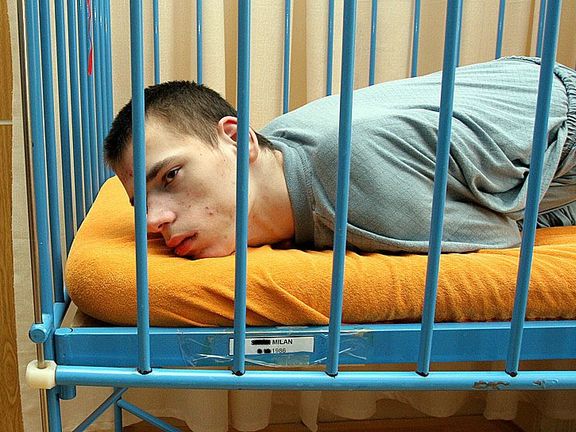
The most common advice for many parents has been to give the child away and let the institutions take care of their daughter or son.
Now, that is starting to change, but there are not enough support services available that would help families with handicapped children.
Viktoria's parents were offered to send her to a kindergarten for blind children - but there are only two such schools in Slovakia.
One of them rejected Victoria because she is not able to move. The other kindergarten was actually a boarding school. "Everyone was saying that that was all they could offer and that there was no other help," recalls Martina Gregorcova.
Full-time job but not enough
During our two hour long visit, Viktoria's mother has played with her daughter with tens of different toys, not leaving the girl alone for a single minute.
"Don't be afraid, it is not going to burn us. It is a candle. Do you want to blow the candle?" she asks little Viktorka who finally blows the candle after a few tries.
"I have read that this is good for their breathing that they have to train. I would really need someone who can help me out," says Mr. Gregorcova.
She and her husband hope that they would be able to find such a support in the UK. "But we are coming to a conclusion that even though there is much they have to offer here everything takes ages," says Mr. Greogorec. "The bureaucracy here is awful."
Local support
The family was able to find support in the local foundation that borrowed them a wheel chair.
The local government provided them with handbooks on children education. The Slovak family has also access to a specialised library with books for blind people.
Once a week Viktoria joins the Play Group - a kindergarten type of institution.
The UK government grants the family 100 pounds a week and Viktoria' s mother gets extra 50 pounds for the care she provides to her daughter.
"We are doing well financially and it is great that we have access to the books and other assistance that we would have never gotten in Slovakia," says Mr. Gregorec.
Great expectations
"But we expected more. We wanted our daughter to go to the kindergarten but we did not want to let her in the school she was at. It seemed that they did not really take care of her, she was sitting alone in her baby-coach for hours and they did not even bring her to the bathroom. Maybe it was because they could not really communicate with her," says Viktoria's father.
The family therefore decided to move to a different municipality.
In the new district they found out that the whole process of asking for help had to be started again from scratch.
They had to request assistance all over again and now they are still waiting to hear what kind of aid they would qualify for.
The disintegration of the social care system for handicapped people was one of the issues that recent report of the Commission for social care inspection in the UK raised a red flag about.
It warned that the UK is getting in trouble because each municipality offers a different type of assistance. That means that it does not really matter how much assistance people need but where they live.
Many people therefore end up trapped in their own home district unable to reach assistance they would be able to get elsewhere.
That effected also Viktoria's family. "After we moved they told us that we qualify for many things but we have to wait for about half a year," says Mr. Gregorec.
Waiting for the better future
His wife tries to overcome her disappointments. "I know that things are changing, even though the process is slow. But I do not want to give up. In Slovakia they told us that they could not help Viktoria so we actually have nothing to lose by staying in the UK," she says.
The Slovak family decided to wait to see if the administration fulfills their promises and provides them with an assistant who would spend a couple of hours a day with Viktoria and would teach her English.
It is evening and Viktoria just ate a little bit of soup that her mother fed her. She is about to go to bed. The day is not over for her mother, however.
She has to turn Viktoria over a couple of times during the night because her daughter is not able to do that on her own.
"Thank you for coming over. I hope you liked it here and come back soon," Viktoria bids us farewell in Slovak.

